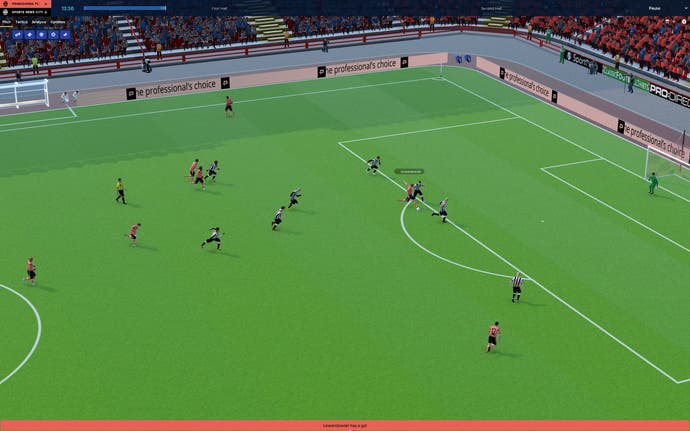Football Manager 2018 review
False nine?
You only need an excuse. The fundamental appeal of Football Manager is the same as it was in the Collyer brothers' debut in 1992, and if at any time in your life that appeal has spoken to you, it will do so forevermore. Really, it's just a matter of how seductively each iteration whispers its new features list at you.
"There's a brand new match engine, you know," says Football Manager 2018, playing absent-mindedly with its hair. "Sports science and data analysis plays much more of a role now too," it continues, making a circle with one hand and moving an index finger in and out with the other. You know in your heart of hearts that it'll be a lot like the last time you spent 215 hours arranging spreadsheets and obsessing over promising teenage trequartistas. But still you cave.
Perhaps the best test of a Football Manager game's mettle, then, is whether you actually miss its new features if you go back and play the last one. To its credit, Football Manager 2018 achieves that comfortably. By contrast, FM 2017's scouting seems a bit shallow, its UI dated, and its fantasy draft mode - the most enjoyable addition in recent years - feels barebones. Having spent enough time with the new game, I'd be loathe to return to the last one now. Maybe it sounds like faint praise, but for an annualised franchise to achieve that is no small thing.

Despite that new match engine offering (a little) more visual sparkle to the experience, it's the backroom that plays host to the game's more impactful changes. Previously player morale was an individual entity affected by results, playing time, injuries, or being fined two weeks' wages over and over again by a belligerent manager. Now with a new set of mechanics ambiguously titled 'dynamics', the dressing room atmosphere is a manageable attribute with a series of meters and everything. In the best way possible, it's an absolute nightmare.
Example: upon achieving promotion from the ignominy of Vanarama North football to the Vanarama National league, I splashed the cash during the next summer at York City and brought in no less than seven players intended to play first-team football. The result was a large-scale revolt from my entire squad, who believed 'top influencers' David Ferguson and Josh Law had been treated unfairly through my failure to reassure them about their place in the team. In other words, because I ticked off two key members of the core social group, all the other members got on my case. The repercussions of this were a poor dressing room atmosphere (lower morale all round), low match cohesion (players lacking vision and teamwork), and a dent in my managerial support (one step closer to the job centre).
Good results, however, will make almost any problem go away. What this dynamics system does is force you to weigh up whether you'll get better results with a hot new player and some irked team-mates, or the same old squad playing in harmony. This has always been a consideration, of course, but rather than trying to second-guess an opaque algorithm in prior instalments, now you're studying actual data as you go about it.
Speaking of that: scouting is a more involving process now, too. After compiling a report on a particular player, your scouts will give them an overall rating out of 100 in addition to the old five-star system. This is a good thing. Firstly because it gamifies the act of uncovering a great player - the satisfaction of seeing that big green '100' is akin to finding an in-form card in FIFA's FUT. Secondly, that number factors in the player's tendencies, asking price, contract demands, experience levels... ad infinitum. More than just an indicator of ability, it's an all-encompassing number that tells you how much a scout believes this potential signing will benefit the club. And with so many other vagaries to manage, in the dressing room and on the pitch, that's nice to have. It does all hinge on having decent scouts in the first place, mind you. Neglect your backroom, and you'll end up with a squad of Thomas Brolins and Klebersons.
Data analysts and sports scientists have also allegedly found their roles expanded this year, although frankly I didn't feel their impact. Admittedly I got a kick out of asking the squares on the York City board to even hire them in the first place, picturing scenes from Moneyball in my mind as I did so. But the reality is less high-fiving Jonah Hill and more 'some extra panels on the scout report'.

With all the off-pitch agonising and inbox-battling done with, the action on the turf is as enjoyable and realistic as it's ever been. That still leaves plenty of room for 'nothing like a real game of football' but slowly and surely FM is bridging the chasm. The new mocapped player animations add a lot of drama to no-look passes, surging headers and volleyed shots, and during the lulls between scoring chances players behave more like human beings. Occasionally a defender will stand stock still in possession of the ball, apparently momentarily frozen by panic, until a baffled opposing striker comes to dispossess them. And more than occasionally attempted crosses will end up going so awry that they force a save from the keeper. And as for the keepers, they're noticeably more awkward in their transitions between animations, and sometimes seem to leap ten feet in the air to punch a ball over the bar.
In these moments you're reminded that the fantasy world you've crafted for yourself over hundreds of hours is nothing but numbers being pitted against numbers, and that will always be FM's biggest problem. The important thing is that it happens less often now, and straight away at the point of release it's playing a believable game of football. As for the overall visual fidelity of that new match engine - well, you won't be mistaking it for FIFA anytime soon. Sega stablemates Creative Assembly lent their expertise with large crowd rendering in the engine's creation, and sure enough there's some endearing detail in the way fans clap and spread their arms wide, chanting something presumably obnoxious. It's a step forwards, but not the huge one you'd imagine when you hear 'new match engine'.
Once again it's the fantasy draft that takes the honours for Football Manager's most compelling mode. Maximum budgets have been raised to a £500 million, and full league functionality has been added for up to 20 teams. It's ironic that fantasy draft began as a way to enjoy the game without having to devote an entire planetary epoch to enjoy it, and has proved so enjoyable that SI are now expanding it into a more long-form experience. It's still not perfect - the drafting process itself still feels like it takes too long, particularly with 20 managers. And although the stripped-back game style helps the pace between matches, if your team isn't working it's very difficult to discern why in the absence of backroom staff advice. Why an attacking trio consisting of Robert Lewandowski, Henrik Mkhitaryan and James Rodriguez wasn't able to break down the defensive pairing of Harry Maguire and Kieran Trippier in 180 minutes of football is a question that will haunt me forever. Nonetheless, I'm as engaged with my £500 million Primadonna FC squad as I am with dragging York City up to the prem.
In the end it's a combination of doing a handful of new things well and avoiding a long list of prior release day issues that earns Football Manager 2018 the privilege of a veteran player's time all over again. The pace of its innovation might be slightly frustrating to those who make huge time investments every year, but if it wasn't doing enough the compulsion to make that investment would evaporate. 50 hours in, the proof of the pudding is in my 'Just one more match, I promise' rating.






